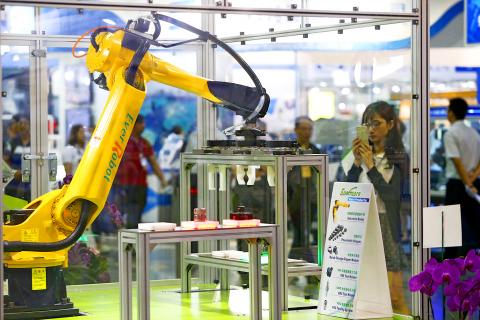The Industrial Technology Research Institute (ITRI, 工研院) yesterday said it is collaborating with local manufacturers to offer new-generation, affordable robots for electronics and logistics companies to automate their factories and warehouses.
Different from the chunky industrial robots that are usually deployed at large-scale factories, the institute said it is more interested in developing collaborative robots for smaller and more diverse factory and depot automation.
“Traditional industrial robots are suitable for large-scale production lines. They need a lot of space and cost a lot of money, which small and medium-sized enterprises cannot afford,” Patrick Yu (游鴻修), acting division director of ITRI’s mechanical and mechatronics systems research labs, told reporters on the sidelines of the Taiwan Automation Intelligence and Robot Show at the Taipei Nangang Exhibition Center, Hall 1.

Photo: CNA
“We believe that collaborative robots, which are designed to work in relative safety with people on the same factory floor, can have richer features and be applied to more industries.”
Such machines could be used to pick up and package goods in an e-commerce depot or in the food processing sector, Yu said.
The Hsinchu-based institute is developing a prototype collaborative robot, Yu said.
The institute has spun off a research unit to put the machines on the market, he said.
The institute in collaboration with Shihlin Electric & Engineering Corp (士林電機) has also developed servomotors for “smart” robotic arms, Yu said.
The institute is also working with Autotek Corp (和樁) to develop an all-in-one machine arm joint, he said.
The institute said its robots would be deployed in smaller factories at affordable prices without major overhauls of workspaces or warehouses.
Their operations would become like Amazon.com Inc’s “smart” warehouses, it said.
Also eyeing growing demand for factory automation, Rong Shin Automation Technology (榮興自動化科技) has partnered with the institute to roll out small, automated conveyor systems for use in the assembly lines and to offer assistance in grocery warehouses.
With a modular design that can be arranged according to where it is to be used, the conveyor systems can transport goods between shelves faster than people, the institute said.
What makes Rong Shin different is that the company also offers leasing services for its products, the institute said.
Noveltek Industrial Manufacturing Inc (恆智重機), which concentrates on goods transportation, also displayed its latest driverless forklifts at the show.

POWERING UP: PSUs for AI servers made up about 50% of Delta’s total server PSU revenue during the first three quarters of last year, the company said Power supply and electronic components maker Delta Electronics Inc (台達電) reported record-high revenue of NT$161.61 billion (US$5.11 billion) for last quarter and said it remains positive about this quarter. Last quarter’s figure was up 7.6 percent from the previous quarter and 41.51 percent higher than a year earlier, and largely in line with Yuanta Securities Investment Consulting Co’s (元大投顧) forecast of NT$160 billion. Delta’s annual revenue last year rose 31.76 percent year-on-year to NT$554.89 billion, also a record high for the company. Its strong performance reflected continued demand for high-performance power solutions and advanced liquid-cooling products used in artificial intelligence (AI) data centers,

SIZE MATTERS: TSMC started phasing out 8-inch wafer production last year, while Samsung is more aggressively retiring 8-inch capacity, TrendForce said Chipmakers are expected to raise prices of 8-inch wafers by up to 20 percent this year on concern over supply constraints as major contract chipmakers Taiwan Semiconductor Manufacturing Co (TSMC, 台積電) and Samsung Electronics Co gradually retire less advanced wafer capacity, TrendForce Corp (集邦科技) said yesterday. It is the first significant across-the-board price hike since a global semiconductor correction in 2023, the Taipei-based market researcher said in a report. Global 8-inch wafer capacity slid 0.3 percent year-on-year last year, although 8-inch wafer prices still hovered at relatively stable levels throughout the year, TrendForce said. The downward trend is expected to continue this year,

Vincent Wei led fellow Singaporean farmers around an empty Malaysian plot, laying out plans for a greenhouse and rows of leafy vegetables. What he pitched was not just space for crops, but a lifeline for growers struggling to make ends meet in a city-state with high prices and little vacant land. The future agriculture hub is part of a joint special economic zone launched last year by the two neighbors, expected to cost US$123 million and produce 10,000 tonnes of fresh produce annually. It is attracting Singaporean farmers with promises of cheaper land, labor and energy just over the border.

US actor Matthew McConaughey has filed recordings of his image and voice with US patent authorities to protect them from unauthorized usage by artificial intelligence (AI) platforms, a representative said earlier this week. Several video clips and audio recordings were registered by the commercial arm of the Just Keep Livin’ Foundation, a non-profit created by the Oscar-winning actor and his wife, Camila, according to the US Patent and Trademark Office database. Many artists are increasingly concerned about the uncontrolled use of their image via generative AI since the rollout of ChatGPT and other AI-powered tools. Several US states have adopted